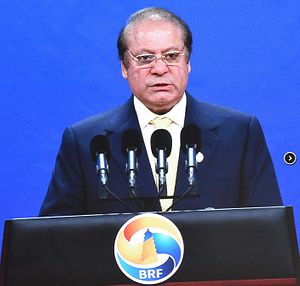On May 15, Dawn, Pakistan’s leading English daily, released an exclusive report detailing the scope, long-term objectives, and focus of the much-discussed China-Pakistan Economic Corridor (CPEC), China’s billion dollar infrastructure project in the country.
Mainly, the CPEC has been mainstreamed in Pakistan as a project that defines the country’s ultimate economic future. However, so far, the government in Islamabad has released no detailed information explaining what the project’s long term goals in the country are and what Pakistan itself stands to gain from the ambitious economic enterprise.
The Ministry for Planning, Development, and Reform in Pakistan, which is primarily responsible for policy formulation regarding CPEC’s implementation in the country, has rejected the report by saying that the released document “delineates the aspirations of both sides,” is “factually incorrect,” and promotes “fears.” The ministry’s response further says that the released report “is a live document” and doesn’t reflect the version that was mutually developed by Pakistan and China and was shared with relevant stakeholders.
On May 16, Dawn published an editorial in an apparent response to the government’s rejection that the former’s report was based on a “redundant document” and was angled to malign the project. The editorial notes that the government’s claim — that an “abridged version” of the CPEC’s long term plan has been shared with key stakeholders — is far from the truth in the sense that it “looks almost identical to the longer version upon which yesterday’s story was based — except that the details have been removed.”
The issue that is of a strategic significance here is the government’s denial to make public the details of a project that is expected to prove a game changer (whatever that means) for Pakistan’s future. A project of such ambitious scale and reach, which goes beyond railroads or highways, needs to be discussed publicly.
For a second, if one is to assume that Dawn’s report was based on a document that is outdated, then shouldn’t the government make public the version that actually depicts the core of this massive economic plan and its implications for the country’s future? It is important to note that the government’s response — that the final version of the plan was agreed upon by all provinces — comes on the heels of inter-provincial conflicts over the distribution of resources and projects relevant to the CPEC.
On the surface level, the details and language of the plan that the government in Pakistan has called outdated points toward a proposal that was chalked and approved by one side, which appears to be Beijing in this case. It wouldn’t be a surprise if many in Pakistan’s government came to know about the actual details of the CPEC through the Dawn report.
According to the released details, while China appears to be positioning itself to make the most of the deal, the document also illustrates how cautious Beijing is in terms of its investments in the country. “Pakistan’s federal and involved local governments should also bear part of the responsibility for financing through issuing sovereign guarantee bonds, meanwhile protecting and improving the proportion and scale of the government funds invested in corridor construction in the financial budget,” noted one paragraph of the Dawn report.
While highlighting China’s concerns regarding Pakistan’s ability to make timely payments on the loans, the report added:
Relying on the assessments of the IMF, World Bank and the ADB, Pakistan’s economy cannot absorb FDI much above $2 billion per year without giving rise to stresses in its economy. It is recommended that China’s maximum annual direct investment in Pakistan should be around US$1 billion.
One of the most interesting aspects of the report deals with the fact that the document showed almost no discussion related to the development of the Gwadar port city and the much-debated new trade route for China through Pakistan:
Gwadar receives passing mention as an economic prospect, mainly for its capacity to serve as a port of exit for minerals from Balochistan and Afghanistan, and as an entreport for wider trade in the greater Indian Ocean zone from South Africa to New Zealand. There is no mention of China’s external trade being routed through Gwadar.
While everyone desires to see the successful implementation of the CPEC, the released details, at no point, highlight Pakistan’s own role in uplifting its domestic economy. Moreover, as pointed out by the Dawn report, the details do not mention how deep Chinese investments, loans, and influence are welcome in the country. On the other hand, it appears that Pakistan’s small economy, agricultural sector, and industry are likely to be overwhelmed by the numerous control points which Chinese investments, takeovers, and loans are going to generate in the coming years.
The plan, in a nutshell, appears to be molded to favor Chinese interests while placing Pakistan’s interests at the periphery. The document doesn’t point towards any collaboration for the buildup of the country’s domestic industry. Apparently the Pakistani government is reluctant to release any details publicly due to concerns related to the politicization of the project. Moreover, the government is also concerned that if the details of the project are made public, it may generate unnecessary attention and debate, domestically and internationally, which may prove an irritant not only for the ruling party, but also for its Chinese counterparts.
However, such apprehensions, by no means, are justified given the stakes that are involved here: while CPEC is a welcome move for the development of Pakistan’s economy, the government needs to make sure that effective measures are kept in place to secure the country’s long term interests. By keeping certain agreements signed under the CPEC a secret, the government is only going to raise further questions.

































